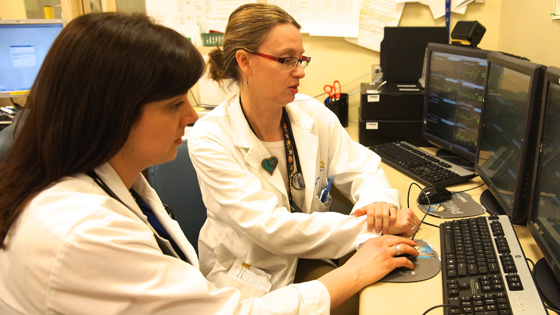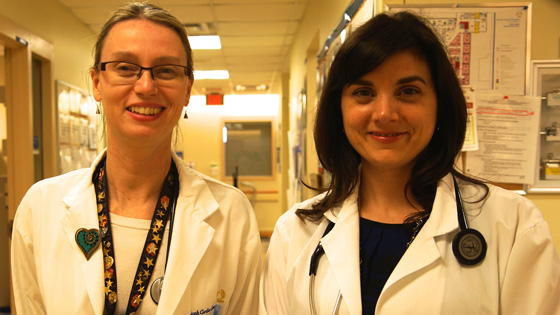
Nurse Practitioners Nadia Thomson (L) and Meredith Linghorne have taken on new roles at the Peter Munk Cardiac Centre since the establishment of the Ted Rogers Centre for Heart Research. (Photo: UHN)
From his hospital stay to his return home, Peter Munk Cardiac Centre patient Daniel Lopes is surrounded by familiar faces – and it makes all the difference.
Whether he's an inpatient or an outpatient, Daniel's specialized nurse practitioners now follow him throughout his continuum of care.
"My nurse practitioners know exactly what I need because they know me," the 32-year-old says. "I don't have to re-explain my cardiomyopathy diagnosis of an enlarged heart to new care providers."
Daniel has been a patient at PMCC since 2007, but this comprehensive model is new.
Previously, many nurse practitioners were assigned to either inpatient care or outpatient care at PMCC. Now, as a result of the establishment of the Ted Rogers Centre for Heart Research (TRCHR), nurse practitioners specializing in heart failure are able to follow patients throughout their care.
Niche role in heart failure
Nurse practitioners Meredith Linghorne and Nadia Thomson took on their new roles at the PMCC in April 2015, a few months following the creation of the TRCHR.
Related to this story:
Established in late 2014, the TRCHR is the first centre of its kind in the world – bringing individualized genomic medicine, stem cell research, bioengineering, and cardiovascular treatment and management together under one umbrella – with the overarching goal of reducing heart failure-related hospitalizations by 50 per cent in the next decade.
Now, both Nadia and Meredith have added roles which align specifically to the centre's goal. Along with the other nurse practitioners at the TRCHR, they have been able to carve out specific niches for their work.
"A nurse practitioner is not only a clinical role. It also involves participating in and leading program planning, education and research initiatives," Nadia explains. "In our roles under the TRCHR we will be able to embrace all aspects of nurse practitioner practice."
She is currently focusing on patient education initiatives for heart failure patients.
"We're looking at developing new ways for how patients receive education on their cardiac health – such as the use of iPads with interactive features in the clinic setting," she says.
Meredith is shaping her role around examining quality indicators.
"I've always had an interest in quality and safety," she says. "I'm working with the team to make sure the care we provide is aligned with quality indicators – for example we are currently working to standardize patient medical order sheets."

Meredith (left) and Nadia are excited about the opportunities that come with their new roles with the TRCHR. (Photo: UHN)
DID YOU KNOW?
Nurse practitioners are:
- Registered nurses with advanced training.
- They have a Master's degree and are certified as nurse practitioners.
Nurse practitioners may:
- Ask about your health history and do medical exams
- Order medicines and tests for you
- Talk to you about your test results
- Teach you about your condition and your care
- Help you and your family plan for going home
Specific patient population
Nadia, Meredith and their peers are also now focused on a very specific patient population – those living with heart failure.
"We are developing specialized expertise in assessing and managing heart failure and these patients often have complex care needs," Meredith says.
"There are always challenges when starting in a new role," she explains, "But I'm excited to be able to contribute to advancing patient care and working with an interdisciplinary team to achieve the goals of the TRCHR program."
The opportunity to care for patients in both an inpatient and outpatient setting is also new territory embraced by Nadia and Meredith. Now they can observe first-hand how patients like Daniel are progressing.
"It's nice to follow patients that you know, to see them when they are doing well and improving, as well as support them and their families in times of need," Nadia explains.
The patients, too, are comforted by this familiarity.
"For me it's great because I've developed a relationship with my nurse practitioners," Daniel says. "I feel more relaxed here because I know them."
